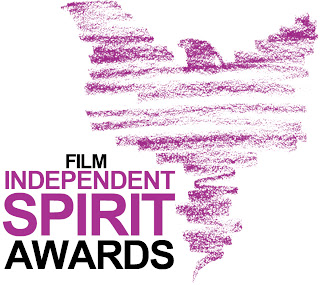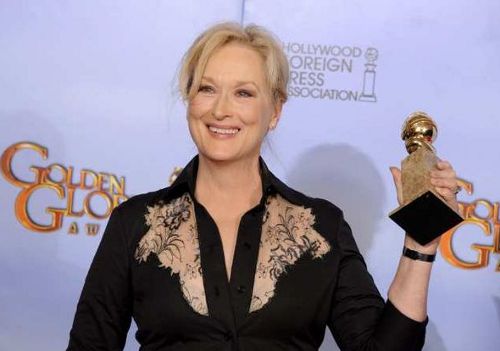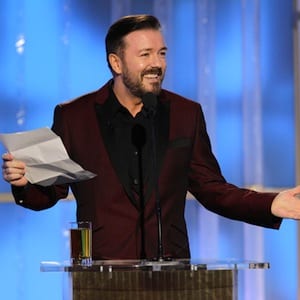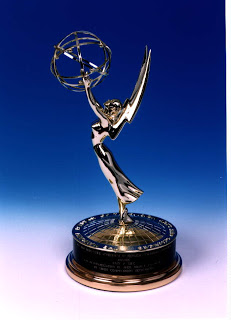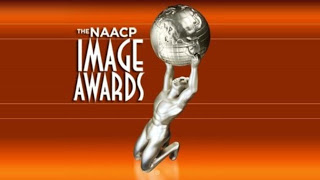Here they are! I don’t have much to say about these (yet), but if we’ve reviewed them or commented on them, I’ll link you up.
Best Motion Picture — Drama
“The Descendants”
“The Help”
“Hugo”
“The Ides of March”
“Moneyball”
“War Horse”
Best Performance by an Actress in a Motion Picture — Drama
Glenn Close, “Albert Nobbs”
Viola Davis, “The Help”
Rooney Mara, “The Girl With the Dragon Tattoo”
Meryl Streep, “The Iron Lady”
Tilda Swinton, “We Need to Talk About Kevin”
Best Performance by an Actor in a Motion Picture — Drama
George Clooney, “The Descendants”
Leonardo DiCaprio, “J. Edgar”
Michael Fassbender, “Shame”
Ryan Gosling, “The Ides of March”
Brad Pitt, “Moneyball”
Best Motion Picture — Comedy or Musical
“50/50″
“The Artist”
“Bridesmaids”
“Midnight in Paris”
“My Week With Marilyn”
Best Performance by an Actress in a Motion Picture — Comedy or Musical
Jodie Foster, “Carnage”
Charlize Theron, “Young Adult”
Kristen Wiig, “Bridesmaids”
Michelle Williams, “My Week With Marilyn”
Kate Winslet, “Carnage”
Best Performance by an Actor in a Motion Picture — Comedy or Musical
Jean Dujardin, “The Artist”
Brendan Gleeson, “The Guard”
Joseph Gordon-Levitt, “50/50”
Ryan Gosling, “Crazy, Stupid, Love”
Owen Wilson, “Midnight in Paris”
Best Animated Feature Film
“The Adventures of Tintin”
“Arthur Christmas”
“Cars 2”
“Puss in Boots”
“Rango”
Best Foreign Language Film
“The Flowers of War” (China)
“In the Land of Blood and Honey” (USA)
“The Kid With a Bike” (Belgium)
“A Separation” (Iran)
“The Skin I Live In” (Spain)
Best Performance by an Actress in a Supporting Role in a Motion Picture
Berenice Bejo, “The Artist”
Jessica Chastain, “The Help”
Janet McTeer, “Albert Nobbs”
Octavia Spencer, “The Help”
Shailene Woodley, “The Descendants”
Best Performance by an Actor in a Supporting Role in a Motion Picture
Kenneth Branagh, “My Week With Marilyn”
Albert Brooks, “Drive”
Jonah Hill, “Moneyball”
Viggo Mortensen, “A Dangerous Method”
Christopher Plummer, “Beginners”
Best Director — Motion Picture
Woody Allen, “Midnight in Paris”
George Clooney, “The Ides of March”
Michel Hazanavicius, “The Artist”
Alexander Payne, “The Descendants”
Martin Scorsese, “Hugo”
Best Screenplay — Motion Picture
Woody Allen, “Midnight in Paris”
George Clooney, Grant Heslov, Beau Willimon – “The Ides of March”
Michel Hazanavicius – “The Artist”
Alexander Payne, Nat Faxon, Jim Rash – “The Descendants”
Steven Zaillian, Aaron Sorkin – “Moneyball”
Best Television Series — Drama
“American Horror Story”
“Boardwalk Empire”
“Boss”
“Game of Thrones”
“Homeland”
Best Performance by an Actress in a Television Series — Drama
Claire Danes, “Homeland”
Mireille Enos, “The Killing”
Julianna Margulies, “The Good Wife”
Madeleine Stowe, “Revenge”
Callie Thorne, “Necessary Roughness”
Best Performance by an Actor in a Television Series — Drama
Steve Buscemi, “Boardwalk Empire”
Bryan Cranston, “Breaking Bad”
Kelsey Grammer, “Boss”
Jeremy Irons, “The Borgias”
Damian Lewis, “Homeland”
Best Television Series — Comedy or Musical
“Enlightened”
“Episodes”
“Glee”
“Modern Family”
“New Girl”
Best Performance by an Actress in a Television Series — Comedy or Musical
Laura Dern, “Enlightened”
Zooey Deschanel, “New Girl”
Tina Fey, “30 Rock”
Laura Linney, “The Big C”
Amy Poehler, “Parks and Recreation”
Best Performance by an Actor in a Television Series — Comedy or Musical
Alec Baldwin, “30 Rock”
David Duchovny, “Californication”
Johnny Galecki, “The Big Bang Theory”
Thomas Jane, “Hung”
Matt LeBlanc, “Episodes”
Best Mini-Series or Motion Picture Made for Television
“Cinema Verite”
“Downton Abbey”
“The Hour”
“Mildred Pierce”
“Too Big to Fail”
Best Performance by an Actress in a Mini-Series or Motion Picture Made for Television
Romola Garai, “The Hour”
Diane Lane, “Cinema Verite”
Elizabeth McGovern, “Downton Abbey” (Masterpiece)
Emily Watson, “Appropriate Adult”
Kate Winslet, “Mildred Pierce”
Best Performance by an Actor in a Mini-Series or Motion Picture Made for Television
Hugh Bonneville, “Downtown Abbey” (Masterpiece)
Idris Elba, “Luther”
William Hurt, “Too Big to Fail”
Bill Nighy, “Page Eight” (Masterpiece)
Dominic West, “The Hour”
Best Performance by an Actress in a Supporting Role in a Series, Mini-Series or Motion Picture Made for Television
Jessica Lange, “American Horror Story”
Kelly MacDonald, “Boardwalk Empire”
Maggie Smith, “Downtown Abbey” (Masterpiece)
Sofia Vergara, “Modern Family”
Evan Rachel Wood, “Mildred Pierce”
Best Performance by an Actor in a Supporting Role in a Series, Mini-Series or Motion Picture Made for Television
Peter Dinklage, “Game of Thrones”
Paul Giamatti, “Too Big to Fail”
Guy Pearce, “Mildred Pierce”
Tim Robbins, “Cinema Verite”
Eric Stonestreet, “Modern Family”

